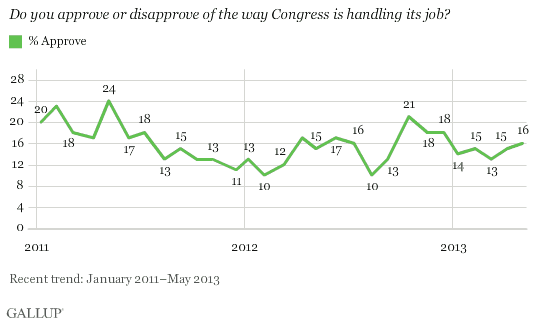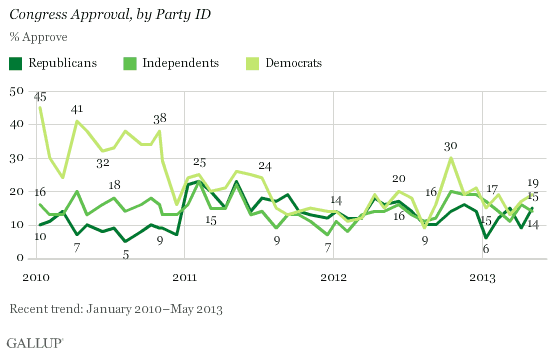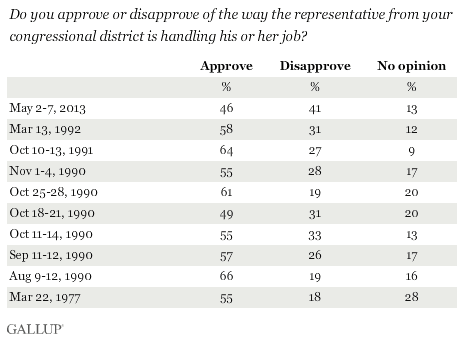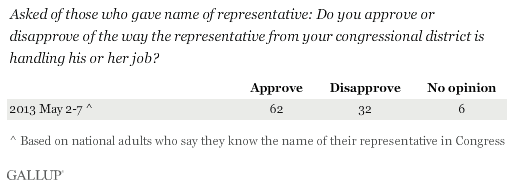WASHINGTON, D.C. -- Americans continue to express frustration with Congress: 16% approve of the job it is doing, essentially the same as in April.

This low level of approval for Congress, from a May 2-7 Gallup survey, is nothing new. Americans have held the nation's legislative branch in low regard for years now. Though not the worst on record -- which was 10%, recorded twice in 2012 -- Congress' approval rating now is far below the 33% average found since 1974. Seventy-nine percent currently say they disapprove.
Fewer Than Two in 10 Democrats, Republicans, and Independents Approve
One thing Democrats, Republicans, and independents can agree on is that they are not happy with Congress. Nineteen percent of Democrats, 15% of Republicans, and 14% of independents currently approve.
Americans in all three groups have been about equally displeased with Congress for several years. Democrats' approval spiked to 30% just before the elections last fall -- but the uptick was short-lived.

Americans More Approving of Their Own District's Representative
Although Americans overwhelmingly disapprove of the job Congress in general is doing, voters re-elect most members of Congress in every election. This phenomenon is partly explained by the finding that Americans have significantly more positive views of their own representative than they do of Congress overall.
About half (46%) of Americans say they approve of the job the representative from their own congressional district is doing. This is on the low end of what Gallup has found historically, although it hasn't asked this question often and not since 1992. From 1990-1992, Gallup asked Americans this question eight times, with approval ratings ranging from 49% to 66% and averaging 58%. In a lone 1977 reading, 55% of Americans approved of their congressional representative.
However, the data suggest that even though Americans continue to be more positive toward their own representative than toward Congress as a whole, they are a bit more negative about the former now than they have been in the past.

Gallup asked a different group of respondents a separate version of the "representative from your district" question. These respondents were first asked if they knew the name and party of their representative, and then whether they approved of that representative. Thirty-five percent of all respondents surveyed knew the name of their representative and, of this group, an even higher 62% approved of him or her.
The difference between the 62% approval rating among this group and the 46% among all Americans suggests that those who do not know their representative's name hold him or her in lower regard. Thus, people who don't know the name of their representative may be evaluating that person largely on their generally negative feelings about how the broader institution is doing.

Americans who say they can name their congressional representative skew older, more highly educated, and somewhat Republican. These characteristics are true of voters in general as well. So this group of people is probably more likely to vote, which helps explain why incumbents keep being re-elected even when Americans as a whole see the job Congress is doing as unsatisfactory.
Bottom Line
Americans do not give Congress high marks on the job it is doing, and haven't for some time. It may be that the extended period of high unemployment and other effects of the recession and 2008 financial crisis are putting Americans in a lengthy bad mood and they are taking it out on Congress -- even though there has been modest improvement in the economy and job market recently, and Americans' economic confidence is rising. In addition, Congress' highly partisan nature and the split party control of the House and the Senate have resulted in gridlock on many important issues facing the nation, such as reducing the federal budget deficit or passing jobs legislation.
Americans may also be frustrated with the issues Congress is focusing on right now. Their top priorities for Congress and the president are creating more jobs and helping the economy grow. But Washington leaders are currently focusing on immigration reform and gun legislation -- the two priorities that Americans rank as least important.
Paradoxically, many Americans actually approve of the job their own district's congressional representative is doing. And those who say they know the name of their representative are even more likely to be positive about that individual's work. This may involve basically nonlegislative ways representatives benefit their districts, such as helping their constituents deal with the federal bureaucracy or bringing federal money back to the district to fund projects that benefit the local economy. Also, in an era when district borders are often drawn specifically to benefit one of the parties, many representatives are likely to be politically in tune with their districts.
Thus, when thinking about Congress as a whole, Americans are nearly as sour as they have ever been, but when they think just about their own representative, they feel much better about the job that person is doing.
Survey Methods
Results for this Gallup poll are based on telephone interviews conducted Feb. 25-26, 2013, on the Gallup Daily tracking survey, with a random sample of 1,017 adults, aged 18 and older, living in all 50 U.S. states and the District of Columbia.
For results based on the total sample of national adults, one can say with 95% confidence that the margin of sampling error is ±4 percentage points.
For results based on the sample of 718 national adults in Form A, the margin of sampling error is ±5 percentage points. For results based on the sample of 817 national adults in Form B, the margin of sampling error is ±4 percentage points.
Interviews are conducted with respondents on landline telephones and cellular phones, with interviews conducted in Spanish for respondents who are primarily Spanish-speaking. Each sample of national adults includes a minimum quota of 50% cellphone respondents and 50% landline respondents, with additional minimum quotas by region. Landline telephone numbers are chosen at random among listed telephone numbers. Cellphone numbers are selected using random digit dial methods. Landline respondents are chosen at random within each household on the basis of which member had the most recent birthday.
Samples are weighted to correct for unequal selection probability, nonresponse, and double coverage of landline and cell users in the two sampling frames. They are also weighted to match the national demographics of gender, age, race, Hispanic ethnicity, education, region, population density, and phone status (cellphone only/landline only/both, cellphone mostly, and having an unlisted landline number). Demographic weighting targets are based on the March 2012 Current Population Survey figures for the aged 18 and older U.S. population. Phone status targets are based on the July-December 2011 National Health Interview Survey. Population density targets are based on the 2010 census. All reported margins of sampling error include the computed design effects for weighting.
In addition to sampling error, question wording and practical difficulties in conducting surveys can introduce error or bias into the findings of public opinion polls.
View methodology, full question results, and trend data.
For more details on Gallup's polling methodology, visit www.gallup.com.
